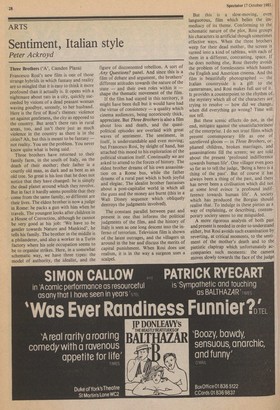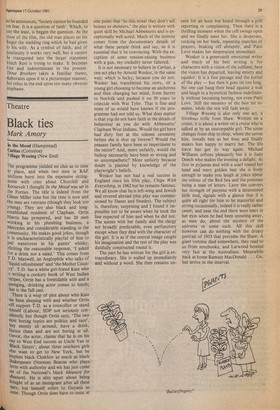ARTS
Sentiment, Italian style
Peter Ackroyd
Three Brothers ('A', Camden Plaza) Francesco Rosi's new film is one of those strange hybrids in which fantasy and reality are so mingled that it is easy to think it more profound than it actually is. It opens with a nightmare about rats in a city, quickly succeeded by visions of a dead peasant woman waving goodbye, serenely, to her husband. Here is the first of Rosi's themes: violence set against gentleness, the city as opposed to the country. But aren't there rats in rural areas, too, and isn't there just as much violence in the country as there is in the cities? Ah, but this is meant to be fantasy — not reality. You see the problem. You never know quite what is being said.
Three brothers have returned to their family farm, in the south of Italy, on the death of their mother; their father is a courtly old man, as dark and as bent as an old tree. So great is his loss that he does not notice that they have changed: he is simply the dead planet around which they revolve. But in fact it hardly seems possible that they come from the same family, so different are their lives. The eldest brother is now a judge in Rome: he packs a gun with him when he travels. The youngest looks after children in a House of Correction, although he cannot be very good at his job: 'We have to be gentler towards Nature and Mankind', he tells his family. The brother in the middle is a philanderer, and also a worker in a Turin factory where his sole occupation seems to be to organise strikes. Here, in a somewhat schematic way, we have three types: the model of authority, the idealist, and the figure of discontented rebellion. A sort of Any Questions? panel. And since this is a film of debate and argument, the brothers' different attitudes towards the nature of the state — and their own roles within it — shape the thematic movement of the film.
If the film had stayed in this territory, it might have been dull but it would have had the virtue of consistency — a quality which cinema audiences, being notoriously thick, appreciate. But Three Brothers is also a film about loss and death, and the quasipolitical episodes are overlaid with great waves of sentiment. The sentiment, in itself, is understandable and even moving; but Francesco Rosi, by sleight of hand, has attached this mood to his exploration of the political situation itself. Continually we are asked to attend to the forces of history. The eldest brother dreams of his own assassination on a Rome bus, while the father dreams of a rural past which is both joyful and elegiac. The idealist brother fantasises about a post-capitalist world in which all the guns and the money are burnt (this in a Walt Disney sequence which obliquely destroys the judgments involved).
The constant parallel between past and present is one that informs the political judgments of the film, and the history of Italy is seen as one long descent into the inferno of terrorism. Television film is shown of the latest outrages, and the villagers sit around in the bar and discuss the merits of capital punishment. When Rosi does use realism, it is in the way a surgeon uses a scalpel. But this is a slow-moving, even languorous, film which belies the immediacy of its theme. Conforming to the schematic nature of the plot, Rosi groups his characters in artificial though sometimes effective ways. When the three brothers weep for their dead mother, the screen is turned into a kind of tableau, with each of them in a different, contrasting, space. If he does nothing else, Rose thereby avoids the problem of formlessness which haunts the English and American cinema. And the film is beautifully photographed — the Italian countryside is a gift to the cameraman, and Rosi makes full use of it. It provides a counterpoint to the rhythm of the mystery which all of the characters are trying to resolve — how did we change, when did everything go wrong? Time will not tell.
But these scenic effects do not, in the end, mitigate against the unsatisfactoriness of the enterprise. I do not trust films which present contemporary life as one of unrelieved gloom — in Three Brothers, orphaned children, broken marriages, and assassinations fill the screen; we are told about the present 'profound indifference towards human life'. One villager even goes so far as to tell the judge, 'Being a hero is a thing of the past'. But of course it has always been a thing of the past, and there has never been a civilisation which did not at some level evince 'a profound indifference towards human life'. A society which has produced the Borgias should realise that. To indulge in these pieties as a way of explaining, or describing, contemporary society seems to me misguided.
A more rigorous analysis of both past and present is needed in order to understand either, but Rosi avoids such examination by reverting, at critical moments, to the sentiment of the mother's death and to the pietistic claptrap which unfortunately accompanies such moments: the camera moves slowly towards the face of the judge as he announces, 'Society cannot be founded on fear. It is a question of faith'. Which, to say the least, is beggin the question. At the close of the film, the old man places on his finger the wedding ring which he had given to his wife. As a symbol of faith, and of continuity it works very well; but it cannot be transposed into the larger statement Which Rosi is trying to make. It becomes trite and indeterminate in the process. Three Brothers takes a familiar theme, elaborates upon it in a picturesque manner, but relies in the end upon too many obvious emphases.







































 Previous page
Previous page